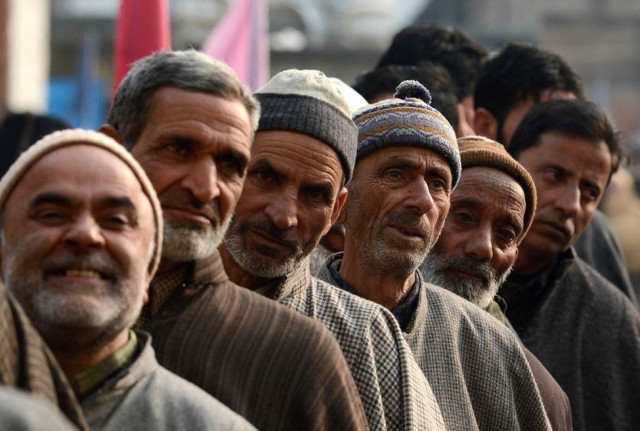Pakistan to turn up the heat on Kashmir again
Govt decides to forcefully internationalise longstanding Kashmir dispute in move which is likely to perturb India

Govt decides to forcefully internationalise longstanding Kashmir dispute in move which is likely to perturb India. PHOTO: AFP
The first indication that Islamabad is all set to push ahead with its decade-old principled stance on Kashmir came on Thursday when a top Pakistani diplomat invited the envoys of the five permanent members of UN Security Council and other European countries to the Foreign Office to brief them on the issue.
Foreign Secretary Aizaz Ahmed Chaudhry told the envoys of these powerful countries that Pakistan would continue to support the ‘indigenous struggle’ of Kashmiris by extending “unflinching political, moral and diplomatic support to Kashmiri people.”
A statement issued here by the Foreign Office quoted the foreign secretary as telling diplomats that recently held elections in Indian-administered Kashmir could not substitute for a UN-monitored plebiscite. He also voiced Pakistan’s concerns over Indian attempts to alter the ground situation through demographic changes.
Aizaz emphasised that the resolution of the Kashmir dispute was pivotal for ensuring peace, security and stability in the region. Paying tribute to the sacrifices of the Kashmiri people in their struggle for self-determination, the foreign secretary stressed that the resolution of this long-standing dispute must be ensured in accordance with the UN Security Council resolutions. For years Pakistan seemed to have shown flexibility over its position on Kashmir issue in an effort to find an ‘out of box’ solution to the longstanding dispute. But recent developments including the hardline position taken by the Bharatiya Janata Party (BJP) government and visit of the US President, during which key agreements were signed, appear to have compelled Islamabad to change its stance.
The foreign secretary, according to the official statement, underscored the crucial role of the international community in helping to bring about a sustainable and lasting solution to the Kashmir dispute. He drew attention to the continuous rights violations by Indian forces in the disputed territory and the plight of the Kashmiris, “of which human rights organisations and the international community are well aware.” He expressed the hope that the international community would continue to remain engaged on this vital issue.
Aizaz also stated that while remaining firm on its just stance, Pakistan is committed to a meaningful and constructive dialogue with India to resolve all outstanding issues, including the core issue of Jammu and Kashmir. He conveyed Pakistan’s concerns on certain agreements which according Islamabad would have detrimental impact on the strategic stability in the South Asian region.
At her weekly news briefing, FO spokesperson Tasnim Aslam said India’s massive acquisition of weapons further complicated the regional strategic stability. “India’s defence spending has increased by 12% in 2014-15 and stands at US$ 38.35 billion. India has been the top buyers of arms for the last three years. In this backdrop, the US-India 10-year defence agreement can only add to the conventional asymmetry and hence strategic instability,” Tasnim told reporters.
She maintained that Pakistan has been proposing a three pronged Strategic Restraint Regime consisting of conflict resolution, nuclear and missile restraint, and conventional balance.
“Pakistan firmly believes that confidence-building and arms reduction in the regional and sub-regional context to be of paramount importance,” she stressed.
About the recent visit of army chief General Raheel Sharif to China in the backdrop of regional developments, the spokesperson termed China as a global power and said it is a ‘factor of regional stability.’
“We are engaged with China very extensively and we believe that globally and regionally China has an important responsibility and role to play for peace, stability, prosperity and development,” she said.
Published in The Express Tribune, January 30th, 2015.



















COMMENTS
Comments are moderated and generally will be posted if they are on-topic and not abusive.
For more information, please see our Comments FAQ